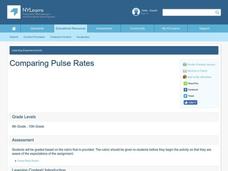Penguin Books
A Teacher's Guide to the Signet Classics Edition of Heart of Darkness by Joseph Conrad
A teacher's guide to Joseph Conrad's Heart of Darkness proves that it is not impossible to delve into the heart of darkness. Containing a wealth of information about Conrad, the Scramble for Africa, and the history of the Belgian Congo,...
Baylor College
Why Circulate?
Lub-dub, lub-dub. Why does the heart beat? Why does blood circulate throughout the body? Life scientists find out how important circulation is for dissolving and dispersing materials by timing how long it takes for food coloring spread...
Curated OER
Why Be Active?
Are there benefits to being physically active? Yes! There are both short-term and long-term benefits! Being physically active doesn't just have strengthen you physically, but also emotionally and socially. Learners find out how to...
Curated OER
Keeping Your Heart in Good Shape: What are the Benefits? - Biology Teaching Thesis
Learners name the main parts of the heart and what events occur there. They write a reaction that contains complete sentences, and uses proper spelling and grammar, after viewing a video. Students define the following terms: contraction,...
Curated OER
Interactive Heart Rate Worksheet
Students perform various cardiovascular activities, then complete a worksheet that records their target heart rate.
Curated OER
Classroom Heart Rates
Students check and record heart-rates of other classmates. They compare and design questions to explain the differences in their findings. Possible explanations might include: the effects of culture, lifestyles, age and gender on heart...
American Physiological Society
Drug the Water Flea
This is a flea. This is a flea on drugs. Any questions? Your class will have questions aplenty during an impactful experiment. Lab groups get to know Daphnia magna, the humble water flea, and study the effects of stimulants and...
Curated OER
Body Voyager
Students explore the significance of a resting and an active heart rate. In this heart lesson students chart data on their pulse and draw a diagram of the heart.
Curated OER
The Human Heart
Third graders explore the human heart and the circulatory system. They observe how exercise affects the heart rate and how blood vessels carry blood through the heart and body. Students observe how the blood is carried to and from the...
Curated OER
Crazy Frog Dance
Teach your young learners some basic line dance steps. Get them moving to increase their heart rates and to have fun. This dance consists of a few steps and there is a part that is for free-style moves. While the written description is...
Curated OER
Heart Rate equals gym grade
Learners find out about an interesting activity that is going on in their school. Then the student interviews students and teachers to see how they would feel if a teacher monitored their heart rate during that specific project and that...
National Association for Sport & Physical Fitness
Indoor Physical Activity Ideas for Kids!
Rainy day schedule doesn't mean you can't stay fit! Use a collection of indoor physical activities during periods of inclement weather, substitute teaching days, or for those afternoons when your class just wants to move around!
Curated OER
Is Your Heart Getting a Good Workout?
Students practice raising their heart rates through exercise. In this physical education lesson plan, students discover the key to a healthy body is a healthy heart that must be exercised often. Students perform a sing along and march...
Texas Heart Institute
Exercise: What Kinds of Activities Are Best?
What happens in the muscles during anaerobic and aerobic exercise, and how does this affect the heart and our overall health? A cross-curricular instructional activity that introduces learners to the lifelong benefits of exercise,...
Curated OER
How Does our Heart Rate Change?
Students feel their pulse and describe it. They predict whether certain activities will increase or decrease their heart rates. Students use a heart rate sensor to determine resting heart rates and those after activity. In conclusion,...
Curated OER
Heart Rate Monitor Warm-up
Young scholars use the heart rate monitor and an exercise bike to help them better understand their target heart rate zone. They wear the Heart Rate Monitor (HRM) and ride the AirDyne bike (that can also monitor the heart rate) or any...
Curated OER
How Do You Measure Up
Students investigate the concept of heart rate and how it is effected by environmental stresses like exercise. They conduct research readings and evaluate the data to form a hypothesis to initiate class discussion about the information.
Curated OER
Comparing Pulse Rates
Young scholars participate in a lab that demonstrate one example of how the human body maintains homeostasis. Students collect data from themselves and observe how their own bodies react to exercise.
Curated OER
Your Beating Heart - Circulatory System
Students illustrate a schematic circulatory system of a human body including heart, lungs, arteries, veins and capillaries. Next, students conduct an experiment to increase understanding of the relationship between heart rate/pulse and...
Curated OER
A Child's Journey through Medicine
Students experience a variety of activities that relate to human physiology and their functions. They create graphs and charts after testing their heart rates and blood pressure They conduct a survey of the student body and create ...
Curated OER
The Effects of Temperature Variations on the Heartbeat Rate of Daphnia
Young scholars use DigiScope technology to investigate Daphinia, popularly known as water fleas. They design, conduct, and report on an experiment to determine the effects of varying water temperatures on the heartbeat rate of Daphnia.
Curated OER
The Heart of the Matter
Upper elementary pupils learn about the blood transportation system and anatomy of the human heart. They fill in an outline of the human heart (not included) focusing on the flow of blood to and from the heart. Using stethoscopes, they...
LABScI
Circulation and Respiration: Vital Signs
What do your vital signs tell your doctor? An engaging hands-on instructional activity has your learners monitor their own lung capacity, blood pressure, and heart rate. They then connect the vital measures to the workings of the...
Curated OER
Local Heart Rates
Students determine the type of data needed to test their inferences. As homework, they check and record heart rates of fellow students, teachers and family members. During their next class period, students enter all data into the database.

























